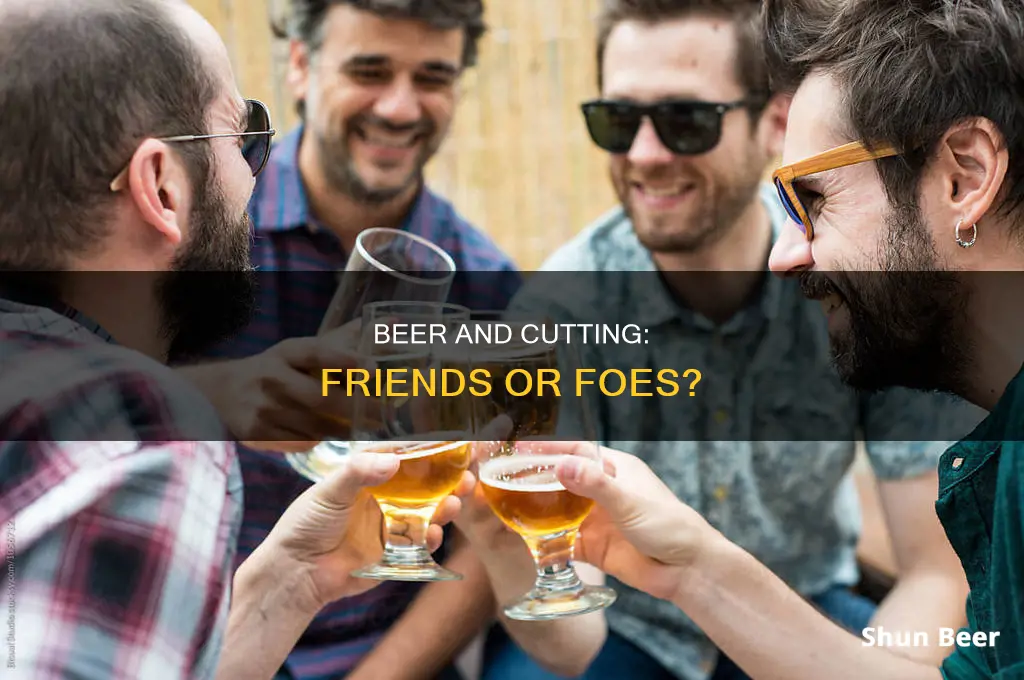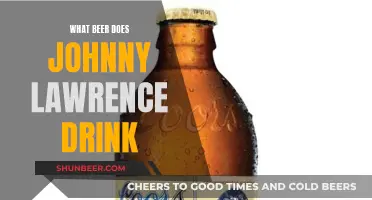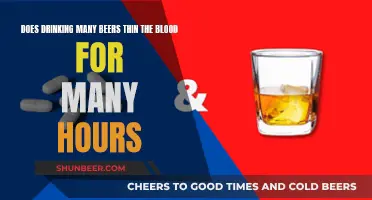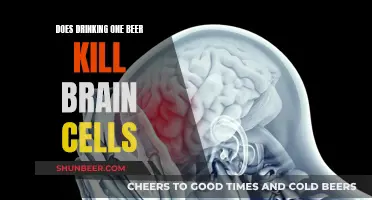
If you're trying to lose weight, you may be wondering if you can still enjoy a drink. The short answer is yes, but there are a few things to keep in mind. Firstly, alcohol is high in calories and can easily cause weight gain, especially when consumed in excess. It's important to drink in moderation and be mindful of the number and type of drinks you choose. Additionally, drinking can lead to poor food choices, so it's crucial to plan your alcohol consumption into your daily calorie count. While it won't directly hinder muscle growth, heavy drinking can affect recovery and performance. So, if you're looking to cut weight, it's best to limit your alcohol intake and prioritize healthy foods and exercises.
What You'll Learn
- Alcohol is not an essential nutrient and is processed differently from other macronutrients
- Alcohol is calorically dense and can hinder fat metabolism
- Alcohol can make you want to eat more
- Drinking in moderation is possible while trying to lose weight
- Alcohol calories take priority as fuel in the body over other sources

Alcohol is not an essential nutrient and is processed differently from other macronutrients
Alcohol is a drug, and like any drug, it is not an essential nutrient. Alcoholic drinks are composed mainly of water, alcohol (ethanol), and varying amounts of sugar. The calories derived from alcohol and sugar are referred to as "empty calories" due to the absence of essential nutrients. Carbohydrates, protein, fat, vitamins, minerals, and water are examples of essential nutrients that provide the body with the tools it needs to function properly. Alcohol is not necessary for a healthy diet and does not fall under the category of an essential nutrient.
Alcohol is processed differently from other macronutrients by the body. When ingested, alcohol is the first nutrient to be burned for energy, taking precedence over fat and carbohydrate oxidation. This can lead to indirect fat gain. Additionally, alcohol does not impact satiety like other nutrients and can encourage overeating by impairing judgment. For instance, one might be more likely to indulge in fast food after a night of drinking.
While alcohol itself cannot be converted directly into body fat, it can contribute to weight gain. Alcoholic beverages are often high in calories, with some mixed drinks containing as many calories as a meal but lacking the same nutritional value. Furthermore, drinking alcohol can lead to poor food choices, as studies have shown. Therefore, while moderate drinking may not significantly impact weight loss or muscle growth, heavy drinking can affect recovery, performance, and calorie surplus, leading to fat gain.
It is important to note that alcohol consumption can become a habit, and it can be challenging to recognize when one is drinking excessively. To change drinking habits, one must first acknowledge and understand their drinking patterns. This involves measuring alcohol intake and identifying triggers or trouble spots. With this awareness, individuals can make conscious choices to reduce alcohol consumption and incorporate it into their fitness and health goals more mindfully.
Beer and Milk: A Dangerous Mix?
You may want to see also

Alcohol is calorically dense and can hinder fat metabolism
Alcohol is calorically dense, with 7 calories per gram, almost as many as a gram of fat. The reason for this is that alcohol is a highly concentrated solution, with 40% alcohol-by-volume in hard liquors. In comparison, beer contains 6% alcohol, but this still adds up.
Alcohol is the first nutrient to be burned for energy when ingested. This means that it takes priority over fat and carbohydrates, which are stored as fat instead. If you eat after drinking, this food is more likely to be stored as fat, as the body is still burning the alcohol for energy. Alcohol also does not affect satiety in the same way as other nutrients, and it can also encourage overeating.
However, it is important to note that alcohol cannot be converted directly into body fat. It has a high thermogenic effect, meaning that it uses a lot of energy to be processed, resulting in a lower net calorie intake than expected.
To avoid weight gain, it is recommended to drink in moderation and to plan alcohol consumption into your daily calorie count. It is also suggested to have a glass of water after each alcoholic drink and to avoid drinking on an empty stomach.
Beer and Lipitor: Safe Mix or Health Risk?
You may want to see also

Alcohol can make you want to eat more
It is generally not recommended to drink beer, or any alcoholic beverage, when you have a cut in your mouth. Alcohol can irritate the wound and slow down the healing process. Additionally, drinking alcohol can impair your judgement and increase the risk of further injury.
Now, on to the topic of alcohol and its impact on appetite. Alcohol can indeed make you want to eat more, and there are several reasons for this. Firstly, alcohol is known to impair inhibitory control, which means you are more likely to give in to cravings and eat more than you usually would. This effect was observed in a study where participants who had consumed alcohol ate more cookies than those in the placebo group. Interestingly, restrained eaters, or those who limit their food intake to maintain or lose weight, were not affected by alcohol in this study.
Secondly, alcohol may cause your brain to think it is starving. This was observed in a study where Agouti-related peptide (AgRP) neurons, which are associated with hunger, were activated in the brains of mice during intoxication. As a result, the mice ate more than usual. This suggests that alcohol triggers a neuronal response that increases hunger and appetite.
The high calorie content of alcohol also contributes to weight gain. A large glass of wine, for example, can contain as many calories as a doughnut. When combined with the increased hunger induced by alcohol, this can lead to excessive calorie intake and subsequent weight gain.
Finally, alcohol can lead to poor food choices. People tend to crave fatty, salty, and carbohydrate-rich foods when they have been drinking. These types of foods are often easily accessible through fast-food restaurants or delivery services. Making a plan before drinking, such as choosing healthier snacks and staying hydrated, can help mitigate the impact of alcohol on your appetite.
Beer and Atkins: What You Need to Know
You may want to see also

Drinking in moderation is possible while trying to lose weight
To drink in moderation while trying to lose weight, it is important to plan alcohol into your daily calorie count. This may involve reducing your food intake to match the calorie content of the alcohol you are drinking. For example, if you plan on drinking three beers, which contain around 600 calories in total, you can reduce your intake of carbs and fat by a corresponding amount. It is recommended to maintain your protein intake for satiety and muscle-sparing properties.
It is also important to be mindful of the type of drinks you choose. Generally, the sweeter the beverage, the more calories it contains. Low-calorie drinks such as spirits are a better option if you want to get a little drunk, while cocktails, beer, or wine are suitable if you are drinking for the taste. Beer contains approximately 150 calories for a 12-ounce glass, while light beer has about 100 calories. Wine and distilled alcohol (gin, rum, vodka, whiskey) have around 100 calories for a 5-ounce and 1.5-ounce serving, respectively.
Additionally, drinking on an empty stomach can lead to faster intoxication and poor food choices. It is advisable to eat a healthy meal or snack before drinking to help slow down alcohol absorption and make better decisions. Studies have shown that alcohol can stimulate appetite and lead to overeating. Therefore, planning a healthy meal or having healthy snacks ready after drinking can help prevent piling on extra calories.
In conclusion, drinking in moderation is possible while trying to lose weight. By being mindful of the number and type of drinks, planning alcohol into your daily calorie count, and watching your eating habits, you can still enjoy a drink or two without hindering your weight loss goals.
How Long Does Beer Last After Opening?
You may want to see also

Alcohol calories take priority as fuel in the body over other sources
The amount of alcohol that gets stored in the body as fat, rather than being used as immediate fuel, depends on how much you drink, the availability of the vitamins and minerals needed to metabolise alcohol, and how much fuel your body requires at the time. About 20% of ingested alcohol is absorbed into the bloodstream from the stomach, and the remaining 80% is absorbed in the small intestine like food. Alcohol travels freely in the blood, which is why levels are tested by checking blood-alcohol concentration. It can’t be stored but spreads in body tissues and fluids—wherever water is present—until it’s metabolised. For the most part, this is done by the liver, although some alcohol metabolism occurs in the stomach too.
The estimated amount metabolised by the liver in an hour is between seven and ten grams. There are seven calories in every gram of alcohol. In comparison, a gram of carbohydrate or protein yields four calories, while one gram of fat has nine calories. Given the equilibrium between “energy in” and “energy out” when aiming for a healthy weight, it’s important to be aware that alcohol is worth almost as much as fat in terms of the energy it provides.
The Magic Behind Beer Engines: How Do They Work?
You may want to see also
Frequently asked questions
Yes, but only in moderation. Alcohol is high in calories and can cause weight gain. If you are cutting weight, you should watch the number and type of drinks you choose.
Health experts recommend that anyone who drinks should do so in moderation. This means no more than one drink per day for women and no more than two drinks per day for men. You may want to drink even less than that if you are trying to cut weight.
Light beer has fewer calories than regular beer, but it still contains a significant amount. If you are trying to cut weight, you may want to stick to low-calorie options such as spirits with zero-calorie mixers.
It is generally safe to consume alcohol with cuts in your mouth. However, alcohol can slow down the healing process and increase the risk of infection, so it is recommended to avoid drinking until the cuts have healed.







